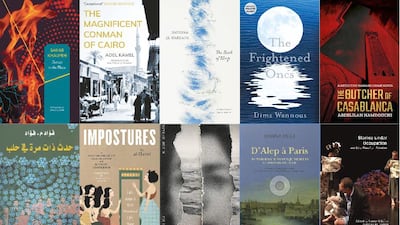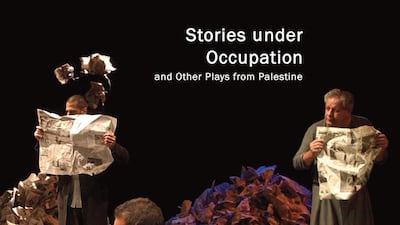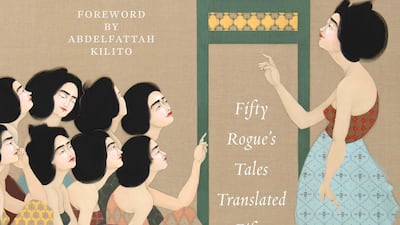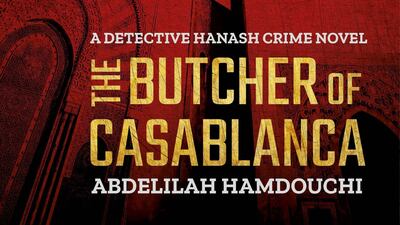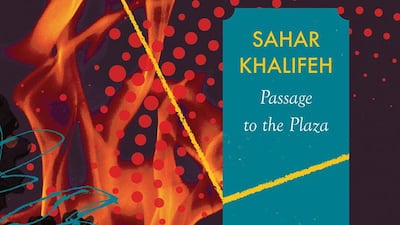Next year promises a diverse range of compelling Arabic books in English translation, for lovers of humour, history, wordplay, theatre, philosophy, mystery and more. They include a satirical Egyptian Second World War-era cult classic, a collection of 11th century rogues' tales from Iraq, a Moroccan murder mystery, an award-winning Palestinian Young Adult novel and the long-awaited appearance of Palestinian author Sahar Khalifeh's best-known novel. Here are 10 of the best to be published next year.
1. ‘Passage to the Plaza’, by Sahar Khalifeh, translated by Sawad Hussain
Seagull Books: February
Khalifeh was named as a finalist for next year's Neustadt International Prize for Literature, and while several of her novels have been translated into English, her classic Bab Al-Saha hasn't, which the Arab Writers Union voted one of the best 105 novels of the 20th century. Its English title is Passage to the Plaza. Set in Bab Al-Saha, a quarter of Nablus, during the 1987 Intifada, it looks at conflict through the eyes of women. A translation of Khalifeh's My First Love will also be published next autumn.
2. ‘The Magnificent Conman of Cairo’, by Adel Kamel, translated by Waleed Almusharaf, with a foreword by Naguib Mahfouz
Hoopoe Fiction: March
This cult classic by Egyptian writer Kamel was originally published in 1942 and largely forgotten. It was only in 2014 that the novel was reissued in Arabic, creating a surge in interest in this contemporary of Mahfouz, who won the Nobel Prize for Literature in 1988. Kamel wrote only a few works, all of them published in the late 1930s and early 1940s, but this vivid novel manages to speak to contemporary readers. In the vein of Waguih Ghali and Albert Cossery, The Magnificent Conman of Cairo delightfully satirises power. Titled Malim the Great in Arabic, the novel follows Malim (Penny), a carpenter's apprentice, and Khaled, the quixotic son of a pasha.
3. ‘Book of Sleep’, by Haytham El Wardany, translated by Robin Moger
Seagull Books: March
What is sleep? As in El Wardany's How to Disappear, which was published in June, the Book of Sleep – written in 2013 – moves between philosophy, anecdotes, poetry, political analysis and story to give us a portrait of contemporary Egypt during the time of former president Mohammed Morsi. It was beautifully translated into English by Moger and is a book to be read slowly and savoured.
4. ‘The Frightened Ones’, by Dima Wannous, translated by Elisabeth Jaquette Harvill
Secker: March
Having featured among the works that were shortlisted for the International Prize for Arabic Fiction last year, The Frightened Ones begins with two Syrians, Suleima and Nassim, meeting in the lobby of their therapist's office in Damascus. Wannous's story then continues as an exploration of how fear changes the human psyche.
5. ‘The Butcher of Casablanca’, by Abdelilah Hamdouchi, translated by Peter Daniel Hoopoe
Hippocrates Press: April
Hamdouchi is at the forefront of Moroccan crime writing. His 2000 novel Whitefly, which was translated into English by Jonathan Smolin in 2016, is a police procedural set in Tangier. Hamdouchi followed that story up in 2001 with The Final Bet, which was translated by Smolin in 2008. The Moroccan writer's latest novel, The Butcher of Casablanca, forms part of a new "Detective Hanash" series that started in 2017 with Bled Dry. In The Butcher of Casablanca, Hanash returns to track a serial killer terrorising Casablanca.
6. ‘Once Upon a Time in Aleppo’, by Fouad Fouad, co-translated by Fouad and Norbert Hirschhorn
Riad El-Rayyes Books: Spring
This collection opens, unusually, with a poem by translator Hirschhorn dedicated to his collaborator, Fouad. The pair are doctor-poets and for years have been working together on translations. This bilingual collection keeps Fouad's poems in the original Arabic, while also interleaving Hirschhorn's translations, which take place between human bodies and cafes and hospital corridors: "Don't rest your head on that foul sheet / Don't ask the woman behind the door / Why she is crying."
7. ‘Impostures’, by Al-Hariri, translated by Michael Cooperson, with a foreword by Abdelfattah Kilito
Library of Arabic Literature: May
Al-Hariri was a poet and scholar in the late 11th and early 12th centuries born in Basra and is known for his standard-setting maqamat, an Arabic genre marked by its rhymed prose. The 50 maqamat in Impostures follow Abu Zayd Al-Saruji as he impersonates a preacher, pretends to be blind and lies to a judge. Although there are earlier English translations, Cooperson's work is an attempt not solely at scholarly accuracy, but also at translating the Arabic wordplay in a way that works in English. Translator Esther Allen has called this "[Herman] Melville's The Confidence-Man meets [Raymond] Queneau's Exercices de style".
8. ‘Minor Detail’, by Adania Shibli, translated by Elisabeth Jaquette
New Directions: May
Shibli's earlier novels Touch (translated by Paula Haydar in 2010) and We Are All Equally Far from Love (translated by Paul Starkey in 2012) examine the difficulty of understanding human relationships in the setting of Israeli occupation. Her latest book, translated by Jaquette, takes place in two time periods: the summer of 1949, when Israeli soldiers murder an encampment of Bedouin in the Negev desert, including a teenage girl, who is raped, killed and buried in the sands. The other time period is the present, when a woman looks into this "minor" crime.
9. ‘From Aleppo to Paris: The Travels of a Young Syrian in the Time of Louis XIV’, translated by Elias Muhanna and Johannes Stephan
Library of Arabic Literature: Autumn
The story we know as "Aladdin" was not part of the One Thousand and One Nights collection assembled in Arabic some time in the 14th or 15th century. Instead, it was relayed to French translator Antoine Galland in 1709 by Hanna Diyab, a Syrian who travelled to Paris from Aleppo. Diyab seemingly never wrote down his version of "Aladdin", but he did write a travel narrative of his adventures in the early 18th century. While this book has been translated to French, next year it will appear in English for the first time.
10. ‘Stories Under Occupation: And Other Plays from Palestine’, edited by Samer Al-Sabeer and Gary English
Seagull Books: June
This collection, which offers a glimpse into contemporary Palestinian theatre, brings together works from across the West Bank, Gaza and Jerusalem.
